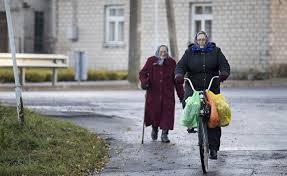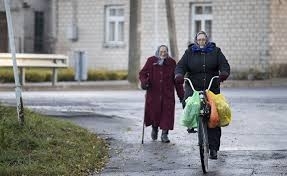Lithuania Disappearing
If nothing changes in Lithuania, the prospect that awaits it in the coming decades is far from encouraging. With the number of workers and children decreasing, and the number of pensioners growing, the potential result is disastrous: no money to increase pensions and increased costs for the maintenance of infrastructure.
The majority of pensioners are found in the districts of the following regions: Ignalina (313.9), Anykščiai (301.9), Zarasai (284.3), Varenskiy (282.1), Birzai (281.1), Ukmergsky (279), Moleti (277.8) and Lazdijsky (276.2). The youngest districts are Neringa (162.7), Vilnius district (177.1), Klaipeda district (179.9), Kaunas district (185.2) and Vilnius (190.7), where pensioners make up every fifth person.
In addition to pensioners, the population is also made up of children, disabled people and the unemployed. According to Sotsmin, at the beginning of 2016 there were 594,400 recipients of old-age pensions, 201,600 disabled people and 152,000 unemployed in Lithuania, totaling almost a million inhabitants. What awaits Lithuania in the coming decades if nothing changes and the number of workers does not increase?
"If you look at what awaits Lithuania in 20 years, then we are definitely facing problems,” says financial analyst Rimantas Rudzkis. “Firstly, the infrastructure in the regions will ‘hang’ due to a shortage of residents”. He explained that, for example, the Šiauliai central water supply is designed to serve 150,000 residents; “if there are just 50,000 remaining, the water will rise in price, and so will heating bills”.
"Everything was being done with due regard for the development of cities, but now everything has changed,” Rudzkis points out. “So, either they need to re-equip the systems, for example, for each block of flats drill wells and build boiler houses, or somehow support the central systems if the number of residents stabilizes. But this has yet to happen- the number of residents is declining”.
Another problem is where to get money for future retirees, especially if there are more of them and the working population is down. "State pensions depend on the economy- first on the number of workers, since their contributions are the main source of pensions. But there may be other taxes, for example, from businesses," said economist, Professor Romas Lazutka, adding that “the more taxpayers, the better for pensioners”.
Rudzkis proposes a solution for the high number of pensioners: "I see an opportunity that could be grabbed- offering Lithuania, Ignalina for example, as a permanent residence for the elderly of Western Europe; offering them care and the provision of medical services. We have a small population density, the country is beautiful, there is nature, and now it is quite cheap… so you can readily consider the export of medical services."
He adds that Lithuania boasts a fairly good healthcare system, and remote medical services are used in the West- when, for example, a blood analysis needs to be done, the sample can be taken in the care home and sent to a large research center abroad. "It would be very beneficial for a pensioner from Germany to live in Lithuania: he would receive money from his homeland but would spend it here, so in Lithuania the amount of funds would grow, consumption would increase, and it would be easier to maintain infrastructure," Rudzkis said.
According to him, pensioners in Lithuania could settle not only from the EU. "We would inevitably have to let people in from other countries, too, to fill the areas that are now empty and in order to prevent loss or damage of infrastructure," the economist said.
He adds that it is necessary to consider the possibility of a more flexible procedure for issuing permits for the residence of foreigners in Lithuania. "All proposals need to be discussed; it is important not to step over the line, so that the foreigners do not pour in massively and make life unpleasant for local residents. A certain number of people can be admitted, provided that they can be expelled from the country if they do not comply with the laws and so on. It is also important that visitors come from countries that are close to the cultural traditions of, say, Ukrainians, Belarusians; that they have a similar mentality and will not create problems”.
As it appears, it needs to be done sooner rather than later.
“Entire areas are actually empty, and something must be done now. Ignalina is such a beautiful town- nature, everything is there, and yet the inhabitants are half that of 20-30 years ago. Better let Ukrainians live there than have everything fall apart,” Ruzdkis concluded.
By Dimitri Dolaberidze












